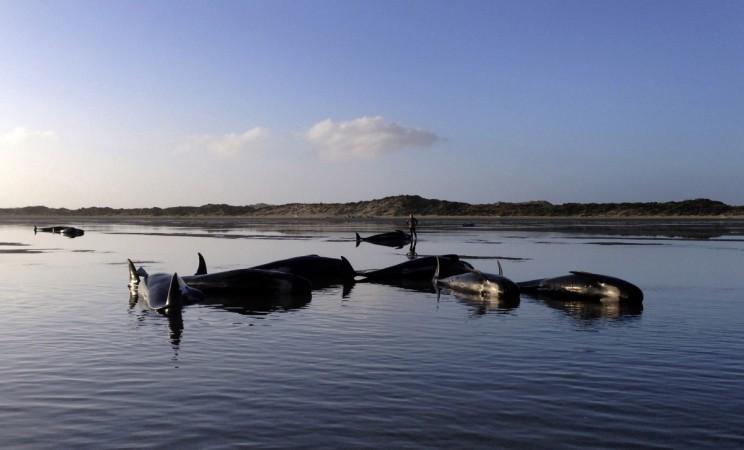
Around 200 whales which were stranded on New Zealand's Farewell Spit during the weekend have been able to float themselves, but they have not left the area and conservation officials fear that they could get stuck on the coastline again.
Also read: Pilot whales: 8 things you need to know about the whales notorious for strandings
More than 600 whales had become stranded on the beach in the last three days. Around 17 whales from the latest pod remain on the shore with carcasses of hundreds of other pilot whales that had become stranded there.
"The 240-odd whales that had stranded between Puponga and Pakawau late on Saturday have mostly re-floated themselves on last night's high tide and are milling around in shallow water," Department of Conservation spokesman Herb Christophers said. "The focus this morning will be to prepare to re-float (the 17) on the incoming tide."
The latest pod that got stranded late on Saturday are different from the group of 400 that was stranded on Thursday night at Farewell Spit in Golden Bay.
An environmental group is helping out with floating the whales by keeping track from a spotter plane flying over the bay.
Around 300 whales who were part of the initial stranding died while authorities made efforts to save the other 100. Most of the 100 whales who were floated reportedly returned to the shore.
"With that number dead, you have to assume that the rest are in reasonably poor nick as well. So, we're sort of preparing ourselves for a pretty traumatic period ahead," Department of Conservation's Regional Manager Andrew Lamason was quoted as saying by AFP.
Around 500 volunteers were pressed into sending the remaining whales into waters, however they were finding it hard to do because of the carcasses across the beach.
"The dead ones that are floating around out there are obstructing their course out to sea. I understand they're concerned about people's welfare. There's quite a safety issue there," Department of Conservation's, Herb Christopherss told AFP.

















